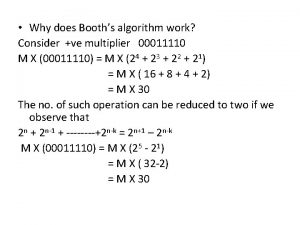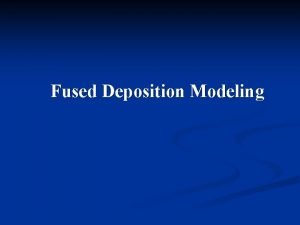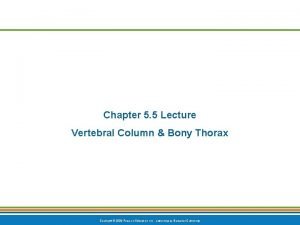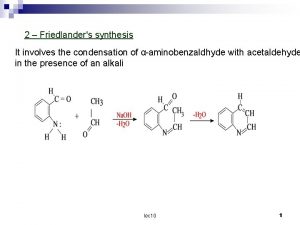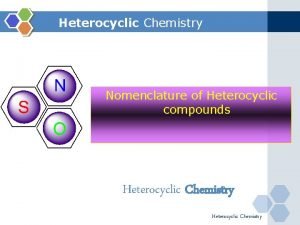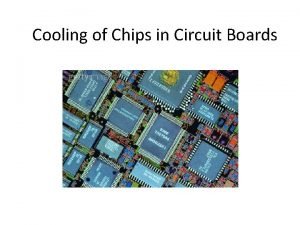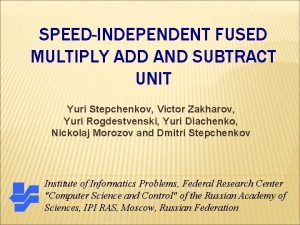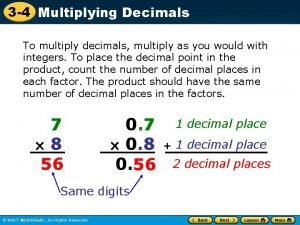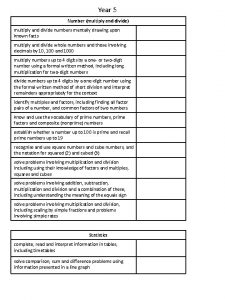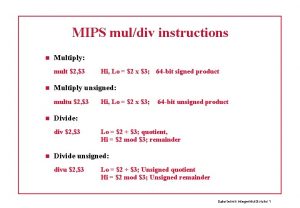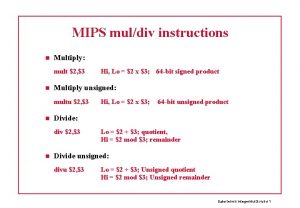Cool one Fused multiply accumulate FMA Using FMA



![//. . . stuff. . . x[0] = y[0]; // 128 b copy x[1] //. . . stuff. . . x[0] = y[0]; // 128 b copy x[1]](https://slidetodoc.com/presentation_image_h/07a2c10fb64e8cd96c25b0aad3375f16/image-4.jpg)














![Mult = 5 cycles Add = 3 cycles FMA = 5 cycles A[5] B[5] Mult = 5 cycles Add = 3 cycles FMA = 5 cycles A[5] B[5]](https://slidetodoc.com/presentation_image_h/07a2c10fb64e8cd96c25b0aad3375f16/image-19.jpg)



![§ for (i=0; i<1000; i++) A[i] = B[i] + C[i]; autovec for (i=0; i<1000; § for (i=0; i<1000; i++) A[i] = B[i] + C[i]; autovec for (i=0; i<1000;](https://slidetodoc.com/presentation_image_h/07a2c10fb64e8cd96c25b0aad3375f16/image-23.jpg)





















- Slides: 44



Cool one: Fused multiply accumulate (FMA) Using FMA everywhere hurts performance
![stuff x0 y0 128 b copy x1 //. . . stuff. . . x[0] = y[0]; // 128 b copy x[1]](https://slidetodoc.com/presentation_image_h/07a2c10fb64e8cd96c25b0aad3375f16/image-4.jpg)
//. . . stuff. . . x[0] = y[0]; // 128 b copy x[1] = y[1]; // 128 b copy //. . . stuff. . . “optimized” //. . . stuff. . . x = y; // 256 b copy //. . . stuff. . . This may cause huge slowdowns on some chips

What?


Intel Pentium 3 (1999) AMD Athlon XP (2001) Intel Pentium 4 (2001) AMD Athlon 64 (2003) Intel Sandy Bridge (2011) AMD Bulldozer (2011) Intel Haswell (2013) Future AMD Chip (? ) Some 128 bit SIMD instructions FP 256 bit SIMD instructions /arch: SSE 2 /arch: AVX 2 Visual C++ ? Visual Studio. NET 2003 Visual Studio 2010 Visual Studio 2013 Update 2 (optimization support) New hotness!



1. 2.




#1

§ _mm_fmadd_ss, _mm_fmsub_ss, _mm_fnmadd_ss, _mm_fnmsub_ss, _mm_fmadd_sd, _mm_fmsub_sd, _mm_fnmadd_sd, _mm_fnmsub_sd, _mm_fmadd_ps, _mm_fmsub_ps, _mm_fnmadd_ps, _mm_fnmsub_ps, _mm_fmadd_pd, _mm_fmsub_pd, _mm_fnmadd_pd, _mm_fnmsub_pd, _mm 256_fmadd_ps, _mm 256_fmsub_ps, _mm 256_fnmadd_ps, _mm 256_fnmsub_ps, _mm 256_fmadd_pd, _mm 256_fmsub_pd, _mm 256_fnmadd_pd, _mm 256_fnmsub_pd /arch: AVX 2


Mult = 5 cycles Add = 3 cycles FMA = 5 cycles A B C 5 cycles C 3 cycles res

Mult = 5 cycles Add = 3 cycles FMA = 5 cycles A B C C D 5 cycles A B 3 cycles res D 5 cycles res
![Mult 5 cycles Add 3 cycles FMA 5 cycles A5 B5 Mult = 5 cycles Add = 3 cycles FMA = 5 cycles A[5] B[5]](https://slidetodoc.com/presentation_image_h/07a2c10fb64e8cd96c25b0aad3375f16/image-19.jpg)
Mult = 5 cycles Add = 3 cycles FMA = 5 cycles A[5] B[5] A[6] B[6] dp A[5] B[5] t 1 A[6] B[6] 5 cycles 3 cycles . . . 5 cycles . . . t 2


#2

Highly optimized CPU code isn’t CPU code.
![for i0 i1000 i Ai Bi Ci autovec for i0 i1000 § for (i=0; i<1000; i++) A[i] = B[i] + C[i]; autovec for (i=0; i<1000;](https://slidetodoc.com/presentation_image_h/07a2c10fb64e8cd96c25b0aad3375f16/image-23.jpg)
§ for (i=0; i<1000; i++) A[i] = B[i] + C[i]; autovec for (i=0; i<1000; i+=4) xmm 1 = vmovups B[i] xmm 2 = vaddps xmm 1, C[i] A[i] = vmovups xmm 2 § for (i=0; i<1000; i++) A[i] = B[i] + C[i]; autovec for (i=0; i<1000; i+=8) ymm 1 = vmovups B[i] ymm 2 = vaddps ymm 1, C[i] A[i] = vmovups ymm 2

32 -bit float scalar CPU: 20 ms Mem: 20 ms 128 -bit SIMD Total: 40 ms Memory Bound 256 -bit SIMD Mem: 20 ms CPU: 80 ms CPU: 10 ms Mem: 20 ms Total: 30 ms Total: 100 ms 2. 5 x speedup 1. 3 x optimized CPU Highly speedup code isn’t CPU code.

Windows task manager won’t help you here


#3

§ Courtesy of http: //eigen. tuxfamily. org/ § § §

8. 5 ms enh yay 6. 4 ms this sucks 10 ms

struct My. Data { Vector 4 D v 1; // 4 floats Vector 4 D v 2; // 4 floats }; My. Data x; My. Data y; void func 2() { //. . . unrelated stuff. . . func 3(); //. . . unrelated stuff. . . x. v 1 = y. v 1; // 128 -bit copy x. v 2 = y. v 2; // 128 -bit copy x = y; // 256 -bit copy } This caused the 60% slowdown on Haswell




§ bugs deathly potholes

void func 1() { for (int i = 0; i<10000; i++) func 2(); } void func 2() { //. . . unrelated stuff. . . func 3(); //. . . unrelated stuff. . . x = y; // 256 -bit copy } void func 3() { //. . . unrelated stuff. . . . = x. v 1; // 128 -bit load from x } vmovups YMMWORD PTR [rbx], ymm 0 mov rcx, QWORD PTR __$Array. Pad$[rsp] xor rcx, rsp call __security_check_cookie add rsp, 80 ; 00000050 H pop rbx ret 0 push rbx sub rsp, 80 ; 00000050 H mov rax, QWORD PTR __security_cookie xor rax, rsp mov QWORD PTR __$Array. Pad$[rsp], rax mov rbx, r 8 mov r 8, rdx mov rdx, rcx lea rcx, QWORD PTR $T 1[rsp] mov rax, rsp mov QWORD PTR [rax+8], rbx mov QWORD PTR [rax+16], rsi push rdi sub rsp, 144 ; 00000090 H vmovaps XMMWORD PTR [rax-24], xmm 6 vmovaps XMMWORD PTR [rax-40], xmm 7 vmovaps XMMWORD PTR [rax-56], xmm 8 mov rsi, r 8 mov rdi, rdx mov rbx, rcx vmovaps XMMWORD PTR [rax-72], xmm 9 vmovaps XMMWORD PTR [rax-88], xmm 10 vmovaps XMMWORD PTR [rax-104], xmm 11 vmovaps XMMWORD PTR [rax-120], xmm 12 vmovdqu xmm 12, XMMWORD PTR __xmm@00000000 test cl, 15 je SHORT $LN 14@run lea rdx, OFFSET FLAT: ? ? _C@_1 FM@KGHGDLJC@ lea rcx, OFFSET FLAT: ? ? _C@_1 BIM@JPMPBING@ mov r 8 d, 78 ; 0000004 e. H call _wassert $LN 14@run: vmovupd xmm 11, XMMWORD PTR [rsi] vmovupd xmm 10, XMMWORD PTR [rsi+16]

§ § The performance landscape is changing. Get to know your profiler.

Recap

Intel Pentium 3 (1999) AMD Athlon XP (2001) Intel Pentium 4 (2001) AMD Athlon 64 (2003) Intel Sandy Bridge (2011) AMD Bulldozer (2011) Intel Haswell (2013) Future AMD Chip (? ) Some 128 bit SIMD instructions FP 256 bit SIMD instructions /arch: SSE 2 /arch: AVX 2 Visual C++ ? Visual Studio. NET 2003 Visual Studio 2010 Visual Studio 2013 Update 2 (optimization support)

1. 2. 3.

Partner Program SPECIAL OFFERS for MSDN Ultimate subscribers Go to http: //msdn. Microsoft. com/specialoffers

Profile your code

Profile your code


 During intense exercise potassium tends to accumulate
During intense exercise potassium tends to accumulate Fma
Fma Shaw fma
Shaw fma The scope of fma 1967 covers in the following sectors
The scope of fma 1967 covers in the following sectors Multiply -5 x-2 by using booth algorithm with flowchart.
Multiply -5 x-2 by using booth algorithm with flowchart. Multiply decimals using partial products
Multiply decimals using partial products Lattice multiplication examples
Lattice multiplication examples One step equations using multiplication and division
One step equations using multiplication and division Chapter 15:4 observing standard precautions
Chapter 15:4 observing standard precautions Fused sentence definition
Fused sentence definition Fused sentence
Fused sentence Permastore factories
Permastore factories Fused sentence.
Fused sentence. Fused deposition modeling definition
Fused deposition modeling definition Fused sentence.
Fused sentence. Comma splice and fused sentences
Comma splice and fused sentences Fused curriculum
Fused curriculum Fused sentence
Fused sentence Upper epiphysis unites with the shaft
Upper epiphysis unites with the shaft The nine vertebrae fused to form two composite bone
The nine vertebrae fused to form two composite bone Pyridine fused with benzene
Pyridine fused with benzene Fused relative clause
Fused relative clause Comma splice
Comma splice What is a fused sentence
What is a fused sentence What is a fused sentence
What is a fused sentence Hantzsch-widman
Hantzsch-widman Fused curriculum
Fused curriculum Can fused calcium chloride dry ammonia
Can fused calcium chloride dry ammonia Fused coronals
Fused coronals One way to cool chips mounted on the circuit boards
One way to cool chips mounted on the circuit boards One god one empire one emperor
One god one empire one emperor One one one little dogs run
One one one little dogs run One king one law one faith
One king one law one faith One empire one god one emperor
One empire one god one emperor One ford plan
One ford plan See one do one teach one
See one do one teach one One price policy
One price policy Structure of twelfth night
Structure of twelfth night See one do one teach one
See one do one teach one One vision one identity one community
One vision one identity one community Graphic organizer with the aims of la liga filipina
Graphic organizer with the aims of la liga filipina Partitioning numbers to 100
Partitioning numbers to 100 Dividing polar form
Dividing polar form Brainpop exponents
Brainpop exponents How to simplify a surd
How to simplify a surd




